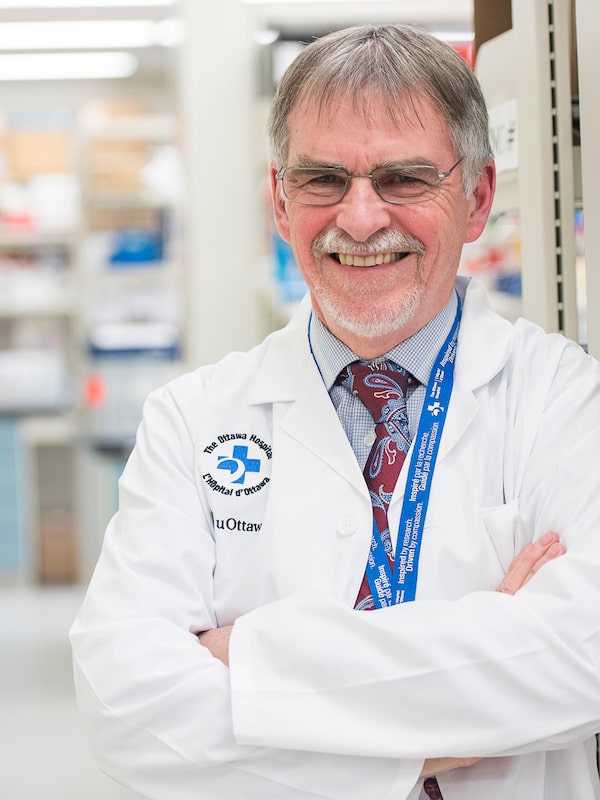Biotherapeutics: The future of medicine
Researchers handle a sample at The Ottawa Hospital's Biotherapeutics Manufacturing Centre, which is being utilized in key trials to produce COVID-19 vaccines. SUPPLIED
World-class biotherapeutics facility at The Ottawa Hospital uses cells, genes and viruses to create unique life-saving treatments
Long before the start of vital work into developing vaccines against the most pressing health threat of our generation — the COVID-19 pandemic — Ottawa became home to a cutting-edge research and manufacturing centre that’s transforming medicine.
The Biotherapeutics Manufacturing Centre (BMC), a state-of-the-art facility established in 2006, is The Ottawa Hospital’s unique contribution to one of the most advanced areas of scientific innovation: biologically based medicines and treatments.
Biotherapeutics have been referred to as “living drugs,” because they use cells and components of cells to prevent, treat and even cure life-threatening conditions. Researching, testing and formulating therapies from biological sources, rather than synthesized chemicals, is ground-breaking work that the BMC has been doing for years. It’s now proving to be crucial in both Canada’s contribution to the worldwide battle against COVID-19 and potentially addressing vaccine shortages in this country.
Drugs “remain the mainstay of most medical therapies,” says Dr. Duncan Stewart, Executive Vice-President of Research at The Ottawa Hospital. However, biotherapeutics may be able to both control symptoms and “potentially be curative,” he explains, citing research advances in cancer, cardiovascular and degenerative brain disease — and now COVID-19 — as examples.
“It’s the future of medicine — no question.”
End-to-end manufacturing, from cells to vaccines
The BMC has been producing high-quality therapies for clinical trials in Canada and around the world for more than 10 years. Examples include CART-T cell immunotherapy for cancer, stem cells for heart and lung disease, gene therapy for rare diseases and cancer-fighting viruses.
The BMC is also the only hospital-based facility in Canada that is producing therapies and vaccines to fight the pandemic, says Dr. Stewart.
“We are able to do the full end-to-end manufacturing, and that includes fill finish: taking the final product and putting it into vials or other containers that can be delivered for direct use to the patient,” he explains.
“We have a world-class biomanufacturing facility embedded within a teaching hospital and are ideally positioned to train these highly skilled technicians and workers, as well as do the manufacturing — this is really where the magic happens.”

Dr. Carolina Ilkow studies how viruses can be used to treat cancer and fight COVID-19.SUPPLIED
Cancer-fighting viruses
The BMC has produced naturally occurring or engineered cancer-fighting (oncolytic) viruses for clinical trials for over a decade. Dr. Carolina Ilkow is part of a team of researchers at The Ottawa Hospital who study how viruses can be used as targeted bio-weapons to treat cancer.
“For the longest time, the reality for many cancer patients is that chemotherapy has been the only option of treatment,” says Dr. Ilkow, who is also an assistant professor at the University of Ottawa. “But we are developing therapies that are less toxic to the healthy tissue and more personalized for patients, and making them in a way that’s affordable to the health-care system.”
Now, scientists are also studying how those same oncolytic viruses, which stimulate the body’s immune system, can be used to fight COVID-19.
“Our main focus and research objective in terms of developing biological therapies has been in cancer, but for the past year, we also have been repurposing some of our knowledge and skills towards the COVID-19 vaccine we’re developing here, and the manufacturing of other vaccines,” says Dr. Ilkow.
“We’re in a pandemic, and a lot of resources and energy, and scientific knowledge has been mobilized to understand this new virus and developing vaccines,” she adds. “One of the things that’s been so surprising is how quickly the scientific community in general has been able to repurpose the knowledge and skills of highly trained people.”
Developing vaccines for clinical trials
The BMC and The Ottawa Hospital “have been involved in producing three commercial COVID-19 vaccines for private-sector partners and we are also developing our own vaccine for use in clinical trials — that is very unique,” notes Dr. Stewart.
The first COVID-19 vaccine the BMC is helping manufacture is a DNA-based vaccine developed by a pharmaceutical company in Alberta. It has already shown promise in lab studies and doesn’t need to be stored in super-deep-freeze conditions (as some other vaccines require), meaning it can be transported more easily.
Vaccine manufacturing requires specialized, ultra-clean facilities and staff trained in using advanced equipment, and all are in place at the BMC. Dr. Stewart says developing and manufacturing vaccines here in Canada would cut costs and wait times, as the four Health Canada-approved COVID-19 vaccines are imported from other countries.
“With the way the virus is mutating, the vaccines we have now may not be sufficient, and we don’t know how long they will last,” he says. “The holy grail would be to develop a vaccine that is independent of these mutations. If that vaccine is successful, it may grant immunity and be less of a problem or susceptible to changes in the COVID-19 virus,” he adds.
A researcher operates a centrifuge in The Ottawa Hospital's Biotherapeutics Manufacturing Centre, where researchers use cells, genes and viruses to develop novel therapies for heart disease, cancer, COVID-19 and more. SUPPLIED
Using stem cells to fight COVID-19
The BMC is also producing mesenchymal stem cells for a clinical trial in patients with severe COVID-19. These cells, which are taken from the umbilical cord, have been shown to reduce inflammation and improve healing of damaged tissue.
Dr. Stewart recalls when the pandemic first started and he had the idea for the trial.
“We had already done a Phase 1 safety trial using the same stem cell therapy to treat people with severe septic shock,” he says. “These patients share many of the same features as COVID-19 patients, including severe lung injury that makes lungs unable to take up oxygen.”
Dr. Stewart also remembers the anticipation of following the first COVID-19 patient in the trial, which launched at The Ottawa Hospital in June 2020.
“It’s always a suspenseful experience especially with a new product … things went very smoothly and there were no problems or reactions. It was amazing.”
The trial is now expanding to several cities across Canada.

Dr. Duncan Stewart says biotherapeutics are "the future of medicine."SUPPLIED
Training the next generation of leaders
With some 40 highly skilled staff currently at the BMC, The Ottawa Hospital also leads Canada’s only hands-on training program in biotherapeutics manufacturing, in partnership with Algonquin College and the University of Ottawa.
“One of the reasons for our success is that we recognized early on shiny new facilities aren’t enough,” says Dr. Stewart.
“What really makes things happen is the people who have this very specialized expertise. … And we are not only training people to work at our facility, but at facilities across the country.”
Funding the future of health care
The BMC’s work has helped it land millions in contract work and competitive grants, but it’s been difficult keeping up with demand for all its cutting-edge work, “so we are looking to expand our facility, and to do that we are going to need funding,” says Dr. Stewart.
The BMC is exploring various funding opportunities, and also benefits from donations to The Ottawa Hospital Foundation.
“The need is to solve this pandemic … but we also shouldn’t forget that cancer and other diseases like cardiovascular and degenerative brain disease are also killing people,” says Dr. Ilkow.
“Without the various forms of funding and important donations, we cannot do cutting-edge science, explore new ideas, and develop and manufacture novel therapies. It’s the funding that keeps all the pieces in the boat going forward.”
Advertising feature produced by Globe Content Studio with The Ottawa Hospital Foundation. The Globe’s editorial department was not involved.



